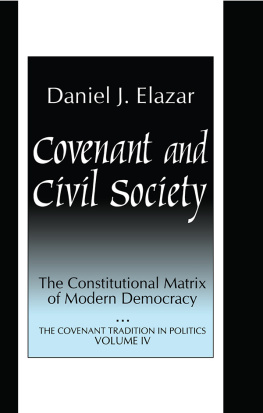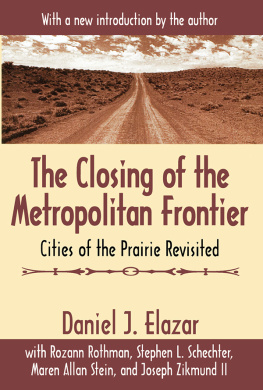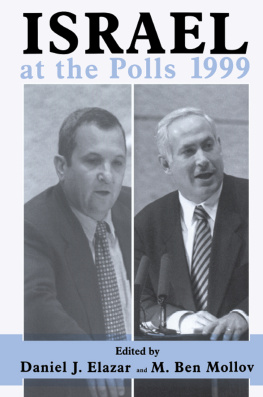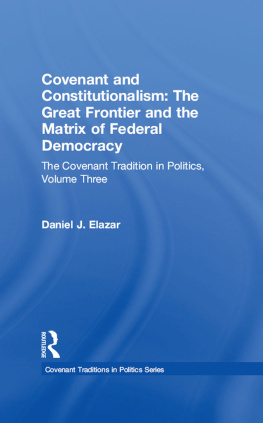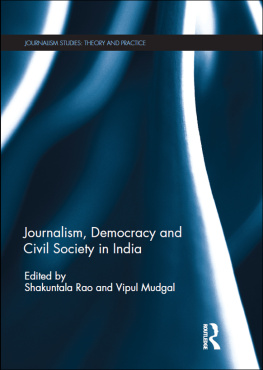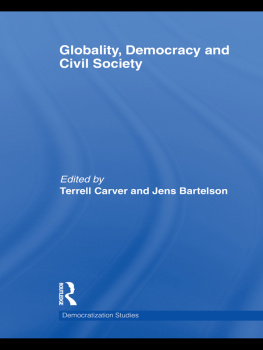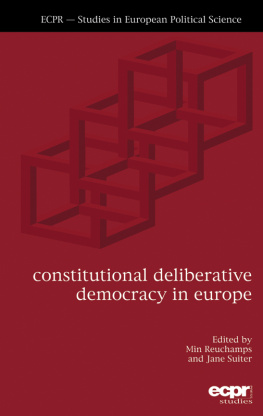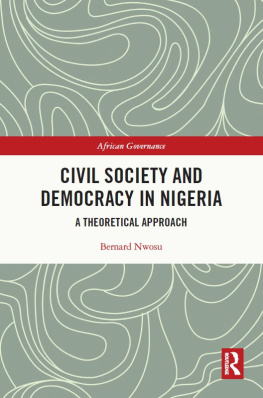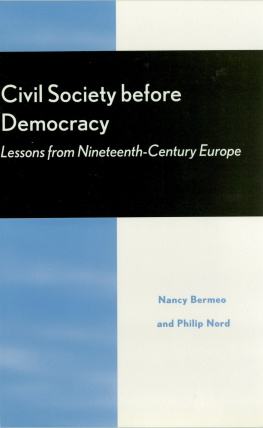Covenant and Civil Society
Daniel J. Elazar
Covenant and Civil Society
The Constitutional Matrix of Modern Democracy
THE COVENANT TRADITION IN POLITICS
VOLUME IV
First published 1998 by Transaction Publishers
Published 2017 by Routledge
2 Park Square, Milton Park, Abingdon, Oxon OX 14 4RN
711 Third Avenue, New York, NY 10017, USA
Routledge is an imprint of the Taylor & Francis Group, an informa business
Preparation of this book for publication was made possible through the Milken Library of Jewish Public Affairs, funded by the Milken Family Foundation.
All rights reserved. No part of this book may be reprinted or reproduced or utilised in any form or by any electronic, mechanical, or other means, now known or hereafter invented, including photocopying and recording, or in any information storage or retrieval system, without permission in writing from the publishers.
Notice:
Product or corporate names may be trademarks or registered trademarks, and are used only for identification and explanation without intent to infringe.
Library of Congress Catalog Number: 97-49240
Library of Congress Cataloging-in-Publication Data
Elazar, Daniel Judah.
Covenant and civil society : the constitutional matrix of modern democracy / Daniel J. Elazar.
p. cm. (The covenant tradition in politics ; v. 4)
Includes bibliographical references and index.
ISBN 1-56000-311-1 (alk. paper)
1. Civil societyHistory. 2. CovenantsPolitical aspects. 3. DemocracyHistory. I. Title. II. Series: Elazar, Daniel Judah. Covenant tradition in politics; v. 4.
BL65.P7E43 1995 vol. 4
[JC336]
301dc21 97-49240
CIP
ISBN 13: 978-1-56000-311-3 (hbk)
This book is dedicated to Jonathan and Ruti. May their lives together be all that is good.
Contents
Preface
This, the fourth of the quartet of volumes on the Covenant Tradition in Politics completes the discussion begun in Covenant and Polity in Biblical Israel which explored the origins of the covenant tradition in the Bible and its subsequent expression in the Jewish political tradition. The second volume, Covenant and Commonwealth, continued the exploration by focusing on the premodern European experience, from the days of ancient Greece and Rome through the rise of Christianity and culminating in the Protestant Reformation. The third volume, Covenant and Constitionalism, focused on the extension of the covenant tradition to what was for Europeans, the New World, discovered at the end of the fifteenth century and settled over the next 500 years. In this volume we will explore the efforts to introduce covenant models derived from the covenant tradition in the Old World during the modern epoch and some efforts, both intentional and unintentional, to revive the covenant tradition or its derivatives in the postwar world. Needless to say, all these explorations are no more than partial, touching upon important highlightsindicators of the covenant tradition, its manifestations and derivatives. No one is more conscoius of what has been omitted and what has been insufficiently explained than this writer. My apologies to my readers for those deficiencies. My only hope is that what is discussed and the framework within which it is presented will be helpful in encouraging others to continue the exploration which I have tried to begin, perhaps to find ways to utilize the covenantal tradition in the never-ending effort of improving our world and the life within it.
Once again, I wish to express my deepest thanks to the Earhart Foundation of Ann Arbor, Michigan, its president, David Kennedy, its secretary and director of programs, Dr. Antony T. Sullivan, and its former president, Richard Ware, for the very tangible encouragement and assistance they have provided me over the years of this effort, and the understanding that accompanied it. Deepest thanks, too, to the institutions with which I have been associated and their staffs, who have been enormously helpful, indeed indispensible: the Center for the Study of Federalism at Temple University in Philadelphia, Pennsylvania; the Jerusalem Center for Public Affairs in Jerusalem, Israel; the Department of Political Studies at Bar-Ilan University in Ramat Gan, Israel. All three have also provided support for this project: the Jerusalem Center through the Milken Library of Jewish Public Affairs, and the Bar-Ilan Department of Political Studies through the Senator Norman M. Paterson Chair in Intergovernmental Relations. They have my deepest gratitude. My sincere thanks also to the Milken Family Foundation for its support for the publication of this book through the Jerusalem Center.
I would like to especially thank Mark Ami-El, publications coordinator of the Jerusalem Center for his vital role in bringing this book to publication, and Deborah Gerber and my other research assistants in both the Philadelphia and Jerusalem centers for their contribution to its final preparations. The final stages of the research for this volume benefitted from the collections of the Weidener Library at Harvard University, where I was a visitor in 1993-1994, one of the worlds major repositories of European and American covenantal materials as befits a university with Harvards origins.
A project of the magnitude of this one requires considerable support from many sources, but no support is more extensive or more critical than that provided by ones own family. My wife Harriet and my children were everything that one could possibly expect in this connection and even more, making it possible for me to live and work in a way most conducive to beginning this undertaking, staying with it, and finally bringing it to a proper conclusion. My love for them is inexpressible as is my gratitude.
In have learned much about covenantal manifestations and expressions from colleagues with whom I have participated in Liberty Fund Colloquia, hence I would be remiss if I did not express my deep gratitude to Liberty Fund, its founder Pierre Goodrich, its board and staff for making those experiences possible.
Special thanks to my good friend Irving Louis Horowitz, founder and guiding spirit of Transaction Publishers, Mary Curtis, Transactions present publisher, and Laurence Mintz, my editor for these four volumes, for their support, encouragement, and contributions to the improvement of the final project. I owe them a great debt.
I have benefitted from the work of so many who have gone before me and from whom I have learned. My apologies to those whom I have failed to acknowledge. Needless to say, any errors are my own and I accept responsibility for them.
DJE
Jerusalem 5757-1997
Introduction
Introduction
The settlement of new worlds by bearers of the covenant tradition in politics (see volume 3, Covenant and Constitutionalism) gave those settlers an unparalleled opportunity to build societies on the covenantal model or as close to it as they could, given the pressures of the environment and parallel traditions borne by other settlers. The bearers of those same covenantal ideas who remained came into conflict with the bearers of the rival ideas of hierarchy and oligarchy. The stage for that conflict was set in the two centuries before the opening of the modern epoch.
In the seventeenth century, with the revival of the idea of covenant as a powerful force, the covenantal idea had had a certain success in those countries reshaped by the Protestant Reformation in its Reformed Protestant (sometimes called Calvinist) version, or where earlier oath and pact societies had existed. Both were found on continental Europe and the British Isles in the borderlands on both sides of the line that had once divided the areas under Roman control from the lands of the barbarian tribes more than a thousand years earlier. Initially they were submerged by Christianity and the political regimes with which the church allied itself as described in volume 2 of this series. In other parts of Europe, however, the covenantal tradition was distinctly a minority one, if it existed at all, and was submerged by one or another of the hierarchical traditions. Thus, in Europe, even more than in the New Worlds, covenantalism confronted major barriers that could only be overcome to some degree.


